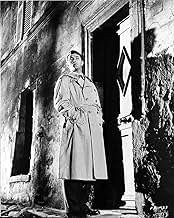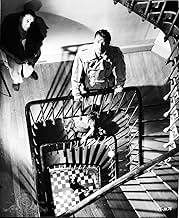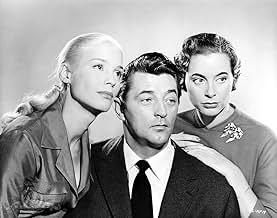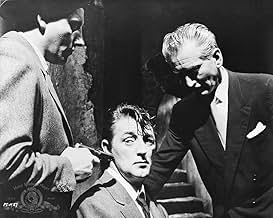IMDb RATING
6.0/10
1.6K
YOUR RATING
When a reclusive, enigmatic millionaire dies suddenly on the Riviera, his press agent begins to investigate his employer's shady past.When a reclusive, enigmatic millionaire dies suddenly on the Riviera, his press agent begins to investigate his employer's shady past.When a reclusive, enigmatic millionaire dies suddenly on the Riviera, his press agent begins to investigate his employer's shady past.
Ingrid Thulin
- Brita
- (as Ingrid Tulean)
Frédéric O'Brady
- Spring
- (as Frederick O'Brady)
Lily Kann
- Blind Housekeeper
- (as Lilly Kann)
Featured reviews
"Foreign Intrigue," a 1956 film starring Robert Mitchum, starts out promisingly enough and peters out. Despite filming in color in France, Sweden, and Monaco, even the film's beauty can't overcome its slow pace and dull script.
Mitchum plays Dave Bishop, who works for an international man of mystery, Victor Danemore. Danemore dies of a heart attack suddenly, and Bishop wonders why every single person he encounters wants to know if Danemore said anything before he died.
Even after working for him, Bishop doesn't know much about him, but he endeavors to find out. He learns that Danemore went to Vienna once a year and goes there.
Danemore's home there is in a slum, his housekeeper is blind, and can only supply him with one name, Olaf Lindquist from Sweden. Bishop finds Lindquist's home, but the man himself is dead.
Bishop and Lindquist's beautiful daughter Brita (Ingrid Thulin) fall for one another; meanwhile, it's obvious her mother is keeping a secret.
Soon Bishop finds himself being followed by one man, Spring (Frederic O'Brady) who won't tell him who he works for, bad-mouthed by Danemore's widow (Genevieve Page) to Brita and her mother, and approached by a group of men who want the names of the men Danemore met yearly in Vienna.
First of all, despite compliments on the music, it was totally overbearing, not to mention loud and intrusive. If you liked it, fine, it was just too over the top for me.
Secondly, this film took way too long to make its point. In the beginning, it was intriguing, but then it began to drag.
Thirdly, we think we're going to find something out and guess what, after all this, we don't.
Robert Mitchum is laid-back and sexy as usual - in this instance, I can't tell if his persona helped the movie or hurt it. He was always a very deliberate actor and perfect for noir - I realize some people call this a noir, and perhaps it was, but the payoff just wasn't there.
It's hard for me to imagine Mitchum hurting a film - I think in this case, I'll have to blame the script and the fact that some time could have been edited out.
Promising start - disappointing finish - pretty to look at.
Mitchum plays Dave Bishop, who works for an international man of mystery, Victor Danemore. Danemore dies of a heart attack suddenly, and Bishop wonders why every single person he encounters wants to know if Danemore said anything before he died.
Even after working for him, Bishop doesn't know much about him, but he endeavors to find out. He learns that Danemore went to Vienna once a year and goes there.
Danemore's home there is in a slum, his housekeeper is blind, and can only supply him with one name, Olaf Lindquist from Sweden. Bishop finds Lindquist's home, but the man himself is dead.
Bishop and Lindquist's beautiful daughter Brita (Ingrid Thulin) fall for one another; meanwhile, it's obvious her mother is keeping a secret.
Soon Bishop finds himself being followed by one man, Spring (Frederic O'Brady) who won't tell him who he works for, bad-mouthed by Danemore's widow (Genevieve Page) to Brita and her mother, and approached by a group of men who want the names of the men Danemore met yearly in Vienna.
First of all, despite compliments on the music, it was totally overbearing, not to mention loud and intrusive. If you liked it, fine, it was just too over the top for me.
Secondly, this film took way too long to make its point. In the beginning, it was intriguing, but then it began to drag.
Thirdly, we think we're going to find something out and guess what, after all this, we don't.
Robert Mitchum is laid-back and sexy as usual - in this instance, I can't tell if his persona helped the movie or hurt it. He was always a very deliberate actor and perfect for noir - I realize some people call this a noir, and perhaps it was, but the payoff just wasn't there.
It's hard for me to imagine Mitchum hurting a film - I think in this case, I'll have to blame the script and the fact that some time could have been edited out.
Promising start - disappointing finish - pretty to look at.
Foreign Intrigue is as bland and generic as its title. Its scantily credentialed director/writer/producer, Sheldon Reynolds, did an early-1950s TV series with the same name, so this movie looks like a bid for big-screen immortality. Alas, it's one of those polyglot productions that suggests financing flowed from several European countries, with strings attached to several cast members; there's no other way to account for their presence.
A wealthy man of mystery drops dead in his villa on the Riviera. His American press agent (Robert Mitchum) finds him but suspicions grow when he's asked four times in succession if his employer `said anything' before he died. So Mitchum sets out to discover who the man was and how he accumulated his fortune. He starts with the merry widow (Genevieve Page) and travels on to Vienna and Stockholm, where he falls for the daughter (Ingrid Thulin) of a deceased industrialist whom may have been a blackmail target. Mitchum finds that he, too, is being followed....
Foreign Intrigue brings to mind Orson Welles' Mr. Arkadin of the previous year, memories of which emphatically ought not to be freshened. There's little true suspense, though the score, by Paul Durand and Charlie Norman, insists that yes, there is. Reynolds tosses in a little Alfred Hitchock here, a little Carol Reed there, but to little avail. About three-quarters of the way through, the picture reaches a lugubrious crescendo by revealing a vast global conspiracy harking back to the Third Reich. The only sensible reaction to all this is Mitchum's, who knew a good paycheck when he saw one and saunters through the movie with his eyes half-shut, as only he could do. Even so, he remains the only reason to sit through this foreign travelogue devoid of intrigue.
A wealthy man of mystery drops dead in his villa on the Riviera. His American press agent (Robert Mitchum) finds him but suspicions grow when he's asked four times in succession if his employer `said anything' before he died. So Mitchum sets out to discover who the man was and how he accumulated his fortune. He starts with the merry widow (Genevieve Page) and travels on to Vienna and Stockholm, where he falls for the daughter (Ingrid Thulin) of a deceased industrialist whom may have been a blackmail target. Mitchum finds that he, too, is being followed....
Foreign Intrigue brings to mind Orson Welles' Mr. Arkadin of the previous year, memories of which emphatically ought not to be freshened. There's little true suspense, though the score, by Paul Durand and Charlie Norman, insists that yes, there is. Reynolds tosses in a little Alfred Hitchock here, a little Carol Reed there, but to little avail. About three-quarters of the way through, the picture reaches a lugubrious crescendo by revealing a vast global conspiracy harking back to the Third Reich. The only sensible reaction to all this is Mitchum's, who knew a good paycheck when he saw one and saunters through the movie with his eyes half-shut, as only he could do. Even so, he remains the only reason to sit through this foreign travelogue devoid of intrigue.
The musical score almost makes it unwatchable. The same transition music throughout the film consists of a tom-tom and Gilligan knocking on a coconut with two wooden dowels. It's enough to cause a coma. That being said, the rest of the film's attributes out-weigh the migraine-inducing music.
Mitchum is classic, using his debonair best to woo admirers of his old-school, Hitchcockian style. (Wonder why Hitchcock never really used him?)
The cinematography uses the 1956 color like an oil painting, still incorporating the contrast and shadows of a black and white noir classic.
It's worth a watch.
Mitchum is classic, using his debonair best to woo admirers of his old-school, Hitchcockian style. (Wonder why Hitchcock never really used him?)
The cinematography uses the 1956 color like an oil painting, still incorporating the contrast and shadows of a black and white noir classic.
It's worth a watch.
I first saw this film as a young boy, and then for years it could not be seen on television, or for that mater anywhere else. I saw the film for the last time in the early 70's, until it was released again early again in this century.
Others have gone into the plot of this film, and I will not do that. What is interesting for me is that the plot of the story is interesting, and it has one of the most unusual ending of any film made in the 1950's. Also while some have criticized Mitchums performance and if he is walking through this film, I think he plays it just right, a man of cool. Ela Fitzgerald once commented that she liked the way Mitchum walked. During the open sequence we see him, I am sure she is referring to this film. Watching him, you realize that if the opportunity had come, and he had wanted to, he could have been the American equivalent to James Bond. Perhaps he could have played the character that Dean Martin would play of Matt Helm, and in films that would have been more in keeping with the books. He really carries this film. His performance reminds me a little of the character he played in OUT OF THE PAST, a wiser Jeff Bailey perhaps.
I see parallels with MR. ARKADIN and THE THIRD MAN, it really tries to be the latter, though does not succeed. It does have the classic look of the film noir, darkness with light shinning through certain areas of the frame, unusual for a color film of the time, and can be quite enjoyable to watch. Also the traces of the Noir film come immediately through when he informs his employers sexy young wife that she now has to become the grieving widow.
Eastman color, while cheaper than the original Technicolor, does have a tendency to fade over time. When I first saw this film in color, it was rather gorgeous to look at. Perhaps the comment about the horrible Eastman color is due to the fading of these prints.
If you liked Robert Mitchum in other films, I highly recommend this film just to see him. Without him the film would not be worth seeing at all.
Others have gone into the plot of this film, and I will not do that. What is interesting for me is that the plot of the story is interesting, and it has one of the most unusual ending of any film made in the 1950's. Also while some have criticized Mitchums performance and if he is walking through this film, I think he plays it just right, a man of cool. Ela Fitzgerald once commented that she liked the way Mitchum walked. During the open sequence we see him, I am sure she is referring to this film. Watching him, you realize that if the opportunity had come, and he had wanted to, he could have been the American equivalent to James Bond. Perhaps he could have played the character that Dean Martin would play of Matt Helm, and in films that would have been more in keeping with the books. He really carries this film. His performance reminds me a little of the character he played in OUT OF THE PAST, a wiser Jeff Bailey perhaps.
I see parallels with MR. ARKADIN and THE THIRD MAN, it really tries to be the latter, though does not succeed. It does have the classic look of the film noir, darkness with light shinning through certain areas of the frame, unusual for a color film of the time, and can be quite enjoyable to watch. Also the traces of the Noir film come immediately through when he informs his employers sexy young wife that she now has to become the grieving widow.
Eastman color, while cheaper than the original Technicolor, does have a tendency to fade over time. When I first saw this film in color, it was rather gorgeous to look at. Perhaps the comment about the horrible Eastman color is due to the fading of these prints.
If you liked Robert Mitchum in other films, I highly recommend this film just to see him. Without him the film would not be worth seeing at all.
Robert Mitchum, employee of a mysterious rich guy with a mysterious source of income, gets involved in FOREIGN INTRIGUE when he seeks out the source of his newly dead employer's seven figure lifestyle on the Riviera. Will the natural scenery of the Riviera, Sweeden and Vienna overwhelm the scenery provided by Bob's bodacious costars?
This is an entertaining enough movie -- and would have been a lot better without the atrocious musical score -- but it is slumming for Mitchum, who probably took the role for the free visits to European hotspots. The main interest IS Mitchum, who acts the role in an interesting fashion. By acting, in each scene, that he just can't quite believe the mother lode of BS that he has just been handed by some suspect, spy type, cute girl, or plot development, he sort of steps aside from the move, and whispers to us that he knows this is all nonsense, but bear with him, the movie won't be too bad. And, because he does that, it really isn't.
Now, frankly, this is a dead-end as an acting approach, and the cul-de-sac at the end is Roger Moore at the close of his James Bond period. But it works for this movie and this actor, where a straighter approach probably just would have failed. We should be grateful, though, that a sequel, suggested by the ending, was not produced.
This is an entertaining enough movie -- and would have been a lot better without the atrocious musical score -- but it is slumming for Mitchum, who probably took the role for the free visits to European hotspots. The main interest IS Mitchum, who acts the role in an interesting fashion. By acting, in each scene, that he just can't quite believe the mother lode of BS that he has just been handed by some suspect, spy type, cute girl, or plot development, he sort of steps aside from the move, and whispers to us that he knows this is all nonsense, but bear with him, the movie won't be too bad. And, because he does that, it really isn't.
Now, frankly, this is a dead-end as an acting approach, and the cul-de-sac at the end is Roger Moore at the close of his James Bond period. But it works for this movie and this actor, where a straighter approach probably just would have failed. We should be grateful, though, that a sequel, suggested by the ending, was not produced.
Did you know
- TriviaAround 53 minutes into the film on the veranda in a romantic scene with a beautiful Swedish woman, a rather large bee flies into the scene and flies right between them. They don't break and the bee flies away.
- GoofsAt about 7 minutes into the movie Mitchum is talking to Paige who is sunning herself at the pool. She tells him to throw her robe to her but when she puts it on, she is actually wearing a patchwork dress.
- Quotes
Dave Bishop: Did you ever ask him who he really was?
Dominique: No.
Dave Bishop: Women are supposed to be curious... especially wives.
Dominique: Press agents are supposed to be curious.
Dave Bishop: I wasn't married to him.
Dominique: Except for the ceremony, neither was I.
- ConnectionsFollows Foreign Intrigue (1951)
- SoundtracksFOREIGN INTRIGUE CONCERTO
Music by Charlie Norman
- How long is Foreign Intrigue?Powered by Alexa
Details
- Release date
- Country of origin
- Official site
- Languages
- Also known as
- Foreign Intrigue
- Filming locations
- Production companies
- See more company credits at IMDbPro
Box office
- Budget
- $625,000 (estimated)
- Runtime
- 1h 40m(100 min)
- Aspect ratio
- 1.85 : 1
Contribute to this page
Suggest an edit or add missing content





























